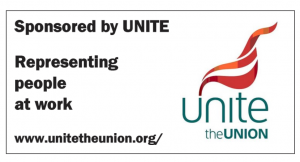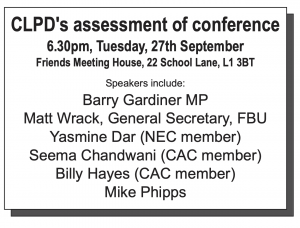Wages Not Weapons
The British cost of living crisis is among the worst of any wealthy country. Rising prices follow a decade of wage stagnation and the erosion of social security benefits and a health pandemic which depleted financial resilience.
Workers now face a real-terms pay cut of 1.9% – for public sec- tor workers that’s an estimated 4.2% pay cut after inflation. Inflation is set to reach 18% in the new year; Gold- man Sachs reckon it will hit 22%.
Liz Truss is committed to increase military spending to a whopping 3% in 2023, which the Royal United Services Institute reckons would cost an eye watering £157 billion. Her jingoistic promise is aimed at Conservative Party members, not based on Britain’s real
This afternoon is the Britain in the World debate where, for the first time in a number of years, there will be no motion for discussion on Palestine.
Arguably we have a good policy frame- work in place from decisions taken in ear- lier years – although, had the opportunity presented itself, taking a Conference position on the assassination of the Palestinian journalist Shireen Abu Akleh would have been a great act of solidarity.
This year however, in the BitW debate, there is a question that needs to be put to David Lammy, and through him to Keir security needs.
Why is Labour backing a rise in defence spending in the midst of the most severe cost of living crisis in decades and distancing itself from striking trade unionists demanding decent pay?
Labour CND believes Labour must reject these un- necessarily high levels of military expenditure. Our Wages Not Weapons campaign calls on the Labour Front Bench to oppose the Government’s military spending increase and commit the next Labour Government to return the
defence budget to its previous level of 2% or below that would enable a multi-billion emergency package of support to off-set the cost of living crisis.
Visit the CND stand and sign up to Labour CND emails to keep in touch.

